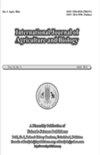印楝油对牵牛花幼苗发育的影响
Q2 Agricultural and Biological Sciences
引用次数: 0
摘要
杂草Ipomoea purpurea L.(旋花科),通常被称为牵牛花,是一种引入巴西的重要入侵植物,它不仅会给一年生作物造成重大损失,还会使收割变得困难,并且在该国已经呈现出耐除草剂的生物型。在这种情况下,寻求管理该工厂的替代和可持续的方法。本研究的目的是评价印楝油对牵牛花种子和幼苗的影响。该实验是在完全随机的设计中进行的,除了对照外,还有六种由不同油稀释液组成的处理,分别在发芽前和发芽后进行。根据实验,观察到印楝油使种子发芽延迟了1.4天,尽管没有显著性。另一方面,播种后施用会严重影响幼苗的鲜重,导致叶枯病的症状。牵牛花幼苗的存活率也遵循同样的模式,只有在播种后施用印楝油才能显著降低。结果表明,印楝油对紫荆幼苗具有植物毒性作用,在发芽后施用时会降低其存活率和鲜重,并在施用到土壤中时影响(延迟)种子出苗。未来应研究较低浓度的影响,这在经济上是可行的,并在现场实践。©2022 Friends Science出版社本文章由计算机程序翻译,如有差异,请以英文原文为准。
Neem (Azadirachta indica) Oil Affects Morning Glory (Ipomoea purpurea) Seedling Development
The weed Ipomoea purpurea L. (Convolvulaceae), known generically as morning glory, is an important invasive plant introduced in Brazil, which not only causes significant losses in annual crops, but also makes harvesting difficult and already presents herbicide-tolerant biotypes in the country. In this context, alternative and sustainable ways of managing this plant are sought. The objective of this work was to evaluate the effect of neem oil on morning glory seeds and seedlings. The experiment was carried out in a completely randomized design, with six treatments composed of different oil dilutions, applied before and after germination, in addition to the control. Based on the experiment, it was observed that neem oil delayed seed germination by up to 1.4 days, although without significance. On the other hand, seedling fresh weight was severely affected by application after sowing, leading to a symptom of leaf blight. Morning glory seedling survival followed the same pattern, where there was a significant reduction by the application of neem oil only after sowing. It was concluded that neem oil has a phytotoxic effect on I. purpurea seedlings, reducing their survival and fresh weight when applied after germination, as well as influencing (delaying) seed emergence when applied to the soil. The study of the effect of lower concentrations, close to economically viable and practiced in the field, should be carried out in the future. © 2022 Friends Science Publishers
求助全文
通过发布文献求助,成功后即可免费获取论文全文。
去求助
来源期刊

International Journal of Agriculture and Biology
AGRICULTURE, MULTIDISCIPLINARY-
CiteScore
1.70
自引率
0.00%
发文量
40
审稿时长
5 months
期刊介绍:
Information not localized
 求助内容:
求助内容: 应助结果提醒方式:
应助结果提醒方式:


